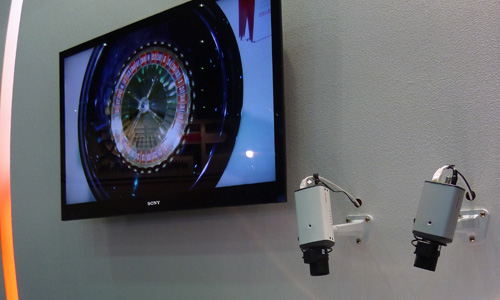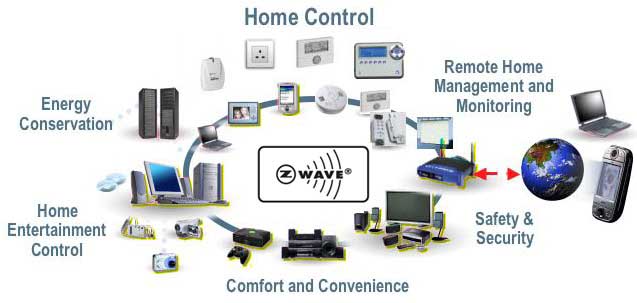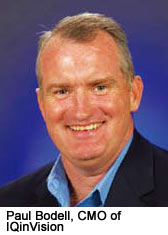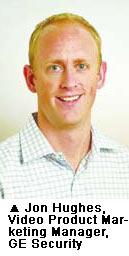In a highly regulated country like Germany, safety and security are not to be joked about. Although the electronic security market in Germany is only growing at a single-digit rate, the sheer size of the country and its infrastructure development can be easily translated into needs worth hundreds of millions that can only fulfilled by high-quality products and support services.
In a highly regulated country like Germany, safety and security are not to be joked about. Although the electronic security market in Germany is only growing at a single-digit rate, the sheer size of the country and its infrastructure development can be easily translated into needs worth hundreds of millions that can only fulfilled by high-quality products and support services.
The German economy is the world's third largest (likely to be surpassed by China soon) and accounts for nearly one-fifth of the European Union's GDP. Germany is the United States' largest European trading partner, according to U.S. Commercial Service, and is the sixth largest market for U.S. exports. Germany's social-market economy largely follows free-market principles, but with a considerable degree of government regulation and generous social welfare programs and protection.
Overall, the European electronic security equipment market (including Eastern Europe) is estimated to be worth US$4.63 billion: video surveillance $1.95 billion, access control $1.03 billion and intrusion alarms $1.65 billion, based on research done by Archana Rao, Senior Research Analyst at Frost & Sullivan (EMEA).
Annual growth rates are 5 percent (30 percent for IP-based solutions), 7 percent and 3 percent, respectively. "For Germany alone, the electronic security equipment market is pegged at $740 million, which can be broken down as: video surveillance $350 million, access control $140 million and intrusion alarms $250 million," Rao said. Annual growth rates are lower than the European averages, at 3 percent (25 percent for IP-based solutions), 5.9 percent and 1.7 percent, respectively.
 Tyco Fire & Security, known as ADT/Total Walther in Germany, and ZVEI ( the German Electrical and Electronic Manufacturers' Association) have different projections. "The video segment accounts for $700 million, whereas intrusion alarms are valued at $800 million," said Roland Billeter, General Manager of Tyco Fire & Security Germany. According to ZVEI, the video market in 2008 is estimated to be worth $540 million, access control $345 million and intrusion alarms $977 million.
Tyco Fire & Security, known as ADT/Total Walther in Germany, and ZVEI ( the German Electrical and Electronic Manufacturers' Association) have different projections. "The video segment accounts for $700 million, whereas intrusion alarms are valued at $800 million," said Roland Billeter, General Manager of Tyco Fire & Security Germany. According to ZVEI, the video market in 2008 is estimated to be worth $540 million, access control $345 million and intrusion alarms $977 million.
"Of the total revenue, 40 percent is generated from video surveillance," said Felix Schrimpf, Manager of EMEA Sales Support, Bosch Security Systems. This year, 24 percent of all Bosch security systems sold are IP-based.
As the largest market in the European Union, Germany is not easy to break into, especially for foreign companies with no local, German-speaking partners or support systems. "The German market demands system-oriented solutions and readily available support," said Andrea Bergerhoff, EMEA Sales Director for Honeywell Security & Data Collection. "That's the reason why we only sell to and work with well-known, local value-added resellers and system integrators."
 Growth Opportunities
Growth Opportunities
For Bosch Security Systems, its top five European countries in terms of sales are Germany, Britain, France, Italy and Spain. "Bosch has been active in Germany, Austria and Switzerland for more than 100 years," said Hanno Vogels, VP of Sales for Germany, Austria and Switzerland, Bosch Security Systems.
Transportation is currently the most dynamic vertical in Germany, with many subway systems and airports undergoing major upgrades, which require state-of-the-art safety and security solutions, said Vogels. "Given the current state of worldwide economy, Bosch remains optimistic as the basic need for security is still there; vertical markets with great potential may change slightly, but Bosch will shift its investments wisely and accordingly to sustain further growth.
Nice agreed with Bosch in saying that the public transport sector has the most potential, due to several bus bombing scares and violent incidents on metro lines. "Retail is another growing vertical, as incidents of shoplifting increase with tougher economic conditions," said Tim Giles, EMEA Product Marketing Manager, Nice Systems.
 Other opportunities, brought up by Tyco and Honeywell, include banking, gaming, critical infrastructure, oil/gas/pipelines, land and sea borders, city surveillance, production plants and commercial buildings. "Vandalism at schools is also getting a lot of attention," said Fredi Reschke, CEO of FRS.
Other opportunities, brought up by Tyco and Honeywell, include banking, gaming, critical infrastructure, oil/gas/pipelines, land and sea borders, city surveillance, production plants and commercial buildings. "Vandalism at schools is also getting a lot of attention," said Fredi Reschke, CEO of FRS.
Legal Issues
Germany is a highly regulated market. "For example, both products and installers have to be certified to be used in commercial establishments or projects that require insurance," said Vogels.
There are also strict data security and privacy laws that call for development of unique access control products.
VdS is likely the biggest entry barrier for foreign companies to penetrate the German market. VdS guidelines and regulations are comprehensive, covering  testing procedures and benchmarks for different product types and system integrators/installers, and different vertical markets also have different standards.
testing procedures and benchmarks for different product types and system integrators/installers, and different vertical markets also have different standards.
UVV Kassenzulassung is another legal requirement applicable to solution providers that sell into the banking sector. "No matter if it is for physical or logical security, all hardware and software must be UVV-certified before a bank opens for business," said Bruno Jentner, Head of Marketing and Product Management for Funkwerk.
Product Needs
The most successful market entrants are those that offer innovative products featuring high quality and modern styling. Germans are responsive to innovation and high technology, based on U.S. Commercial Service's observations.
Price is not necessarily the determining factor for the German buyer, given the German market's demand for quality. The German market is decentralized and diverse, with interests and tastes differing dramatically from one state to another. Successful market strategies take into account regional differences as part of a strong national market presence.
The country boasts one of the highest Internet access rates in the European  Union, and this helps increase adoption rates of IP-based security solutions tremendously.
Union, and this helps increase adoption rates of IP-based security solutions tremendously.
Video Surveillance
"In Germany, IP video is at least growing at 50 percent per year," said Michael Zabler, Marketing Director for ABUS Security-Center. On the other hand, most German users demand reliability and have strong doubts about open systems.
"Who will be held responsible when a system fails?" asked an industry source. "Analog systems still fare better in a typical system integrator's or installer's mind." As a result, he thinks that IP adoption is no more than 20 percent in video surveillance.
There is no doubt that Germans wanted high-quality, relatively expensive products five years ago. "Now, people are starting to feel the financial pinch and are  accepting imports from Asia with open arms," said Bj?rn Westphal, Media Specialist at Monacor International.
accepting imports from Asia with open arms," said Bj?rn Westphal, Media Specialist at Monacor International.
Features in demand include high-definition resolution, analytics and management software that brings about geospatial, situational awareness.
Access Control
As employee tracking is legally prohibited in certain German industries (automotive, for example), access control and information management require advanced hardware engineering and software algorithms.
"Some customers ask for high-end solutions that allow for masking based on authorization levels," said Nicole Huffer, Corporate VP of Marketing Communications for SimonsVoss Technologies. "Sometimes, even time/attendance data can only be accessed by lawyers and courts."
Intrusion Alarms
Alarm systems are usually the first ones that go into a building before completion, said Bergerhoff, and these products are the most heavily policed by law in Germany.
"Currently, only 0.3 percent of German households are equipped with intrusion alarms," said Zabler, "so there is still plenty of potential for growth in the  residential sector, a long with small-to-medium enterprises. Depending on insurance requirements, customers can choose approved products at different price levels."
residential sector, a long with small-to-medium enterprises. Depending on insurance requirements, customers can choose approved products at different price levels."
One industry source pointed out, though, one noticeable change: the increased demand for wireless systems, requiring less expensive, labor-intensive installation work, and integrated intrusion/access/fire solutions.
Challenges and Outlook
Real German GDP expanded by 2.5 percent in 2007 despite the increase in value-added tax from 16 to 19 percent in January 2007, according to U.S. Commercial Service. Consumer demand, which had been sluggish for several years, is picking up. The economy continues to be strong on exports; consumption and investment have started to pick up since 2006 and are expected to compensate for some of the world economic slowdown.
Business confidence indices rose in early 2007 and show signs of optimism, despite uncertainty in financial markets. The German economy continues to suffer from structural problems, including over-regulation in labor markets, taxation and business establishment, as well as high social-insurance costs.
Experienced representation is a major asset to any market strategy, given that primary competitors are domestic firms with established presence. Firms can  overcome such stiff competition, said a U.S. Commercial Service representative, by offering high-quality products, services at competitive prices, and sales backup, as well as establishing a local network of support. For investors, Germany's relatively high marginal tax rates and complicated tax laws may constitute an obstacle, although deductions, allowances and write-offs help move effective tax rates to internationally competitive levels.
overcome such stiff competition, said a U.S. Commercial Service representative, by offering high-quality products, services at competitive prices, and sales backup, as well as establishing a local network of support. For investors, Germany's relatively high marginal tax rates and complicated tax laws may constitute an obstacle, although deductions, allowances and write-offs help move effective tax rates to internationally competitive levels.
The German government has recognized the need for reform and is pursuing a series of initiatives. "While many observers regard these programs as a useful start," one source said with caution, "most expect that additional reforms to enhance Germany's global competitiveness will be required while consensus will become more difficult in the run-up to federal elections in 2009."
German firms focusing on exports, especially in the automotive, chemical and high-tech sectors, recently have enjoyed healthy profits and have exported more goods and services than firms from any other country.
Persistent high unemployment, particularly long-term (longer than one year) unemployment, has long been among Germany's most serious political and economic problems. The economic growth Germany has experienced since 2006, however, has reduced in a rapid fall of unemployment to levels not seen since before the German unification.
Since the beginning of 2006, what had been an export –led recovery has begun to  expand into the domestic economy. Investment in machinery and equipment has grown rapidly, and business confidence has risen.
expand into the domestic economy. Investment in machinery and equipment has grown rapidly, and business confidence has risen.
The latest survey results from the Munich-based Ifo Institute show that optimism prevails despite the uncertainty resulting from the sub-prime mortgage crisis in the United States.
The strong revival of the German labor market continued in 2007. Registered unemployment fell by 15.7 percent to below 3.8 million on an annual average, according to U.S. Commercial Service. This corresponded to a decline in the unemployment rate from 10.8 percent in 2006 to 9 percent, the largest year- to - year decline in Germany's history.
In eastern Germany, the unemployment rate stood at 15 percent and was still twice as high as in the western part of the country, based on CIA's World Factbook research. The Federal Employment Agency's Institute for Labor Market Research has projected an average of 3.5 million unemployed for 2008, provided the current demand for labor continues. While much of the improvement has been the result of an expanding number of temporary or low-paid jobs, more significantly, the number of socially insured and self-employed jobs has risen, too.
Germany has pressed the new EU Commission to reduce regulatory burdens and promote innovation in order to increase the EU member states' competitiveness. The Merkel government has talked about the need of regulatory reform in Germany as well, said a U.S. Commercial Service representative. Germany's regulations and bureaucratic procedures can prove baffling. While not directly discriminatory, government regulation is often complex and may offer a degree of protection to established local suppliers.
Safety or environmental standards, not inherently discriminatory but sometimes zealously applied, can complicate access to the market for foreign products. Companies interested in exporting to Germany should make sure they know which standards apply to their products and obtain timely testing and certifications.
German standards are especially relevant to exporters because Europe-wide standards are often based on existing German ones.
Conservative buying behavior can still be regularly witnessed, said Billeter. This could present challenges to the transition to and adoption of converged hardware and software solutions.
The biggest challenge for promoting IP is the knowledge of the system integrators in IP technology, said Vogels. "But this has improved as a result of training over the last two years." All major players will continue to focus on partner training and user education.
Despite some of the challenges listed above, Germany continues to be attractive in numerous sectors and remains an important element of any comprehensive export strategy to Europe.
More information on VDS.